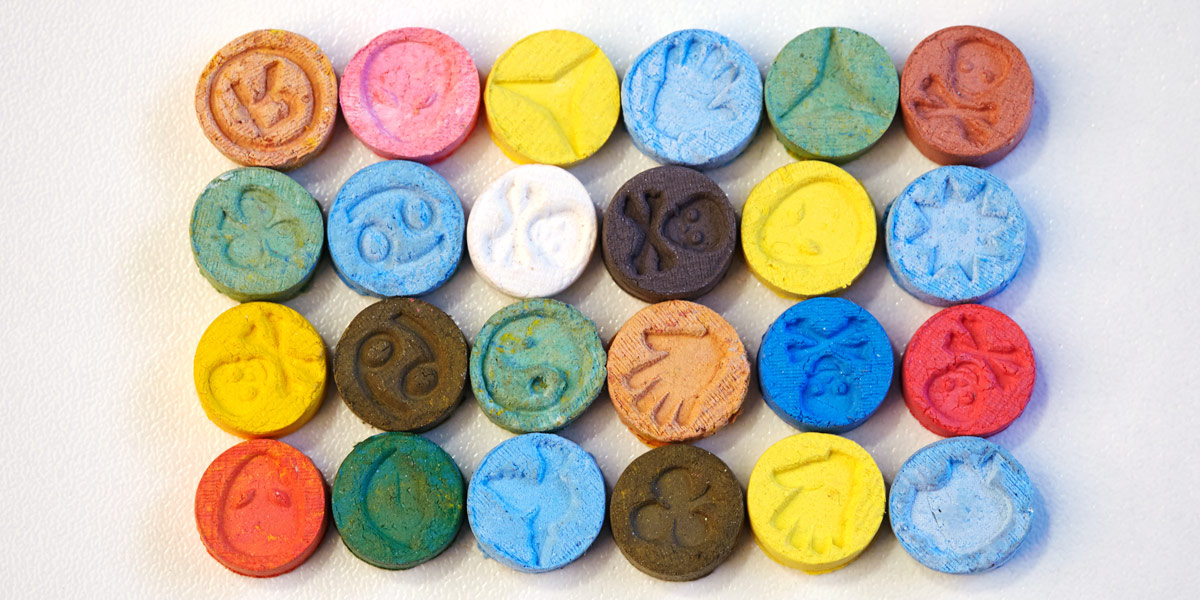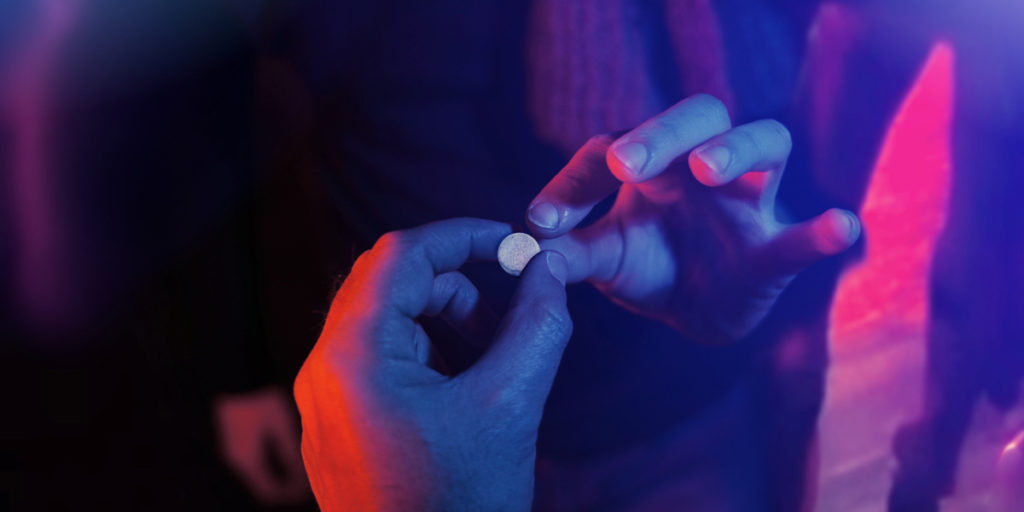MDMA (Ecstasy/Molly) Facts and Effects on the Brain

Methylenedioxy-methamphetamine (MDMA) was first developed for medical use in 1912 but was never marketed. Its first use was in the 1970s to aid in psychotherapy due to its effects on promoting a patient’s empathy and communication. However, it had no supporting clinical research or FDA approval.
Today, it is considered a “party drug” and continues to be used by millions. Besides being made an illegal drug in 1985, classified as Schedule I because of its high potential for abuse and harmful health effects, it is made in illegitimate laboratories that mix in harmful, unknown additives.
What Is MDMA?
Popularly known as ecstasy or molly, MDMA is a psychoactive drug that acts as a psychedelic and stimulant. MDMA is entirely synthetic, made illegally in labs from its parent drug compound, amphetamine. However, its chemical structure causes stimulating and hallucinogenic properties making it like combining amphetamine and mescaline.
How Is MDMA Used?
People usually take MDMA orally, swallowing it in a capsule or tablet. Sometimes, the tablet is crushed and snorted in powder form and occasionally smoked or ingested in liquid form.
Molly, slang for molecular referring to the pure MDMA powder found inside, is mainly sold in capsules. Ecstasy is generally distributed in colorful tablets, often with recognizable logos.

Pure MDMA
Much of the MDMA seized by police is manufactured in Canada, a small amount in the Netherlands, and is typically never pure. Additionally, some underground laboratories have been identified in the U.S. to sell various forms of synthetic illicit drugs containing harmful substances.
Most drugs sold as ecstasy or molly that are supposedly pure MDMA contain other drugs such as ketamine, cocaine, methamphetamine, cough medicine, caffeine, and cathinones, the psychoactive ingredient in bath salts.
Side Effects
The wanted side effects of MDMA produce feelings of euphoria, happiness, and well-being. It causes increased energy, heightened senses, and emotions of warmth and kindness for other people that facilitate communication and trust that can last about 3 to 6 hours.
Unfortunately, it can have hazardous effects on the mind and body, with symptoms including:
- Irritability
- Aggression
- Impulsiveness
- Anxiety
- Difficulty sleeping
What Are MDMA’s Effects on the Brain?
MDMA functions by elevating three brain chemicals – serotonin, dopamine, and norepinephrine.
Serotonin – is responsible for mood, appetite, sleep, libido, and other vital functions. The desired effects of MDMA are a direct result of the large amount of serotonin the drug releases, including triggering sexual arousal.
Dopamine – produces increased energy and controls motivation, cognitive function, and, critical to encouraging addiction, the reward system in the brain that reinforces behaviors.
Norepinephrine – is a stress hormone that increases blood pressure and heart rate. This is particularly risky for people with blood vessel and heart problems.

Long Term Psychiatric Problems
Research suggests that the effects of MDMA on the brain’s serotonin-producing system may be the reason for several patient’s mental problems that have outlasted the drug experience by months or years.
Lingering mental issues linked to the drug’s use include:
- Memory loss (verbal and visual)
- Loss of the executive function of the brain (inability to make decisions, process information, reason, or problem solve)
- Lack of self-control
- Repeatedly paranoia, hallucinations, and flashbacks
- Psychotic episodes
- Depression
Does It Cause Depression?
Low levels of serotonin are linked to severe depression and occasionally accompany suicidal thoughts. The rush of serotonin from MDMA use drains the brain of this naturally occurring chemical, and with continued use, it can reduce a person’s ability to feel pleasure.
Physical Effects of MDMA
Its physical effects are like other stimulants such as cocaine or amphetamines because it causes increased heart rate and blood pressure.
Other effects include:
- Muscle cramping
- Nausea
- Involuntary jaw clenching and teeth grinding
- Blurred vision
- Chills
- Sweating
High doses of MDMA can affect the body’s ability to regulate temperature. This can create a sudden increase in body temperature called hyperthermia, resulting in liver, kidney, heart failure, or even death.

What Are Other Health Effects of MDMA?
Additionally, because MDMA causes feelings of closeness and encourages intimacy and trust with others, its use, especially when combined with other substances, may promote unsafe sexual behaviors. This boosts an individual’s risk of contracting or spreading a sexually transmitted disease (STD), such as HIV and hepatitis.
Increased Risk
Compounding the dangers of MDMA use is the random composition of the drug. Some of the toxins found in ecstasy can cause brain damage and pose a significant risk of overdose because the doses of MDMA can vary significantly, even in the same form and batch. The combination of MDMA and one or more hazardous chemicals can cause unpredictable and adverse health conditions.
Treatment for MDMA Addiction
Treatment for ecstasy/molly misuse is available. The biggest obstacle is acknowledging if treatment is necessary and finding the appropriate recovery program.
Because ecstasy is a psychoactive drug and impacts one’s mind immensely, resulting co-existing disorders are common. The National Institute on Drug Abuse (NIDA) recommends behavioral therapies as an effective aid in treatment.
Finding a rehabilitation program that offers behavioral therapies and addresses co-occurring mental health issues is crucial to a successful recovery. Northridge Addiction Treatment Center has compassionate, experienced medical staff with comprehensive knowledge and experience.
If you or a loved one struggles with an ecstasy addiction, NATC’s residential treatment program with a co-occurring disorder program and behavioral therapies such as cognitive behavioral therapy and dialectical behavior therapy may be a perfect fit.
NATC’s private facility can provide a safe, comfortable, and supportive setting for your journey from addiction to lifelong peace. Call today to begin the path to your recovery.
Find Meaningful Recovery
Our caring and compassionate specialists are eager to help you comfortably navigate this journey to recovery. Our individualized treatment plan, programs, and therapies may be a perfect match for you or your loved one. Let us assist you in living the happy life you deserve. It starts with a phone call.




